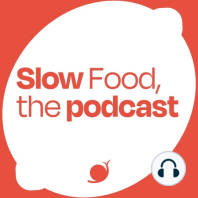57 min listen

Terra Madre ecosystems: Forest people and land grabbing
Terra Madre ecosystems: Forest people and land grabbing
ratings:
Length:
50 minutes
Released:
Nov 3, 2020
Format:
Podcast episode
Description
The indigenous population doesn’t destroy, we’re only looking for conservation, the preservation of the environment. Indigenous people are the biggest protectors of the Earth. That’s us, the indigenous people are the greatest defenders of nature, of animals, of biodiversity, of the waters… All of that is thanks to the indigenous people _ Murilo Juruna
Today, the SFYN Podcast dedicated to Terra Madre 2020 kicks off its ecosystem exploration journey with an episode dedicated to forests and in particular to forest peoples and land rights. The urgency of creating this particular episode is due to the following target set by the Convention on Biological Diversity in the ‘zero-draft’ Global Biodiversity Framework: “By 2030, protect and conserve through a well connected and effective system of protected areas and other effective area-based conservation measures at least 30% of the planet with the focus on areas particularly important for biodiversity”, so they are suggesting that we increase from 17% (as it is today) to 30% the surface of our planet that will be preserved as a natural reserve.
What you and I may not realize at first glance is that creating natural reserves often means removing the indigenous peoples that are currently living on those lands, who are then forced to move to “somewhere else” which is often not specified by the local authorities.
Interviewees:
- Michele Fontefrancesco, assistant professor in Anthropology at UNISG;
- Dauro Zocchi PhD researcher at UNISG;
- Winnie Kadoshy Sengwer, indigenous Sengwer women from the Embobout forest, Kenya;
- Imanul Huda, indigenous leader in the forest area of Kapuas Hulu, in Indonesia;
- Murilo Juruna, spokesman for the indigenous Slow Food Juruna community of the Cassava in the Brazilian Amazon (Valorização da Mandioca do Povo Juruna km 30).
Find out more about Terra Madre: www.terramadresalonedelgusto.com
Interested in the topic? Join the free Terra Madre Forum "Forest peoples' food systems and the threat of land grabbing" on the 21st November. Register at: https://terramadresalonedelgusto.com/en/event/forest-peoples-food-systems-and-the-threat-of-land-grabbing/
Become a SFYN Patron and get access to extra material: http://patreon.com/join/slowfoodyouthnetwork/
Project manager and podcast host: Valentina Gritti
Composition, production and editing: Leonardo Prieto Dorantes
Brazilian Percussion: Philip Kukulies
Goni: Agustín Fernández
African Ensemble: Kabele bah, Paul Valdivia, Guillermo siliceo, Jorge whaley y Juan Domingo Rogel; maestro Gwagoro Keita.
Sound database: Acoustic Ecology Lab @ASU
Financed by the European Union.
The contents of this podcast are the sole responsibility of the author and the EASME is not responsible for any use that may be made of the information contained therein.
A project by the Slow Food Youth Network
Today, the SFYN Podcast dedicated to Terra Madre 2020 kicks off its ecosystem exploration journey with an episode dedicated to forests and in particular to forest peoples and land rights. The urgency of creating this particular episode is due to the following target set by the Convention on Biological Diversity in the ‘zero-draft’ Global Biodiversity Framework: “By 2030, protect and conserve through a well connected and effective system of protected areas and other effective area-based conservation measures at least 30% of the planet with the focus on areas particularly important for biodiversity”, so they are suggesting that we increase from 17% (as it is today) to 30% the surface of our planet that will be preserved as a natural reserve.
What you and I may not realize at first glance is that creating natural reserves often means removing the indigenous peoples that are currently living on those lands, who are then forced to move to “somewhere else” which is often not specified by the local authorities.
Interviewees:
- Michele Fontefrancesco, assistant professor in Anthropology at UNISG;
- Dauro Zocchi PhD researcher at UNISG;
- Winnie Kadoshy Sengwer, indigenous Sengwer women from the Embobout forest, Kenya;
- Imanul Huda, indigenous leader in the forest area of Kapuas Hulu, in Indonesia;
- Murilo Juruna, spokesman for the indigenous Slow Food Juruna community of the Cassava in the Brazilian Amazon (Valorização da Mandioca do Povo Juruna km 30).
Find out more about Terra Madre: www.terramadresalonedelgusto.com
Interested in the topic? Join the free Terra Madre Forum "Forest peoples' food systems and the threat of land grabbing" on the 21st November. Register at: https://terramadresalonedelgusto.com/en/event/forest-peoples-food-systems-and-the-threat-of-land-grabbing/
Become a SFYN Patron and get access to extra material: http://patreon.com/join/slowfoodyouthnetwork/
Project manager and podcast host: Valentina Gritti
Composition, production and editing: Leonardo Prieto Dorantes
Brazilian Percussion: Philip Kukulies
Goni: Agustín Fernández
African Ensemble: Kabele bah, Paul Valdivia, Guillermo siliceo, Jorge whaley y Juan Domingo Rogel; maestro Gwagoro Keita.
Sound database: Acoustic Ecology Lab @ASU
Financed by the European Union.
The contents of this podcast are the sole responsibility of the author and the EASME is not responsible for any use that may be made of the information contained therein.
A project by the Slow Food Youth Network
Released:
Nov 3, 2020
Format:
Podcast episode
Titles in the series (83)
Equity, Inclusion and Justice: a conversation with Jim Embry #SFYNtalks: Slow Food Youth Network wants to raise attention for the concept of social justice within our movement and in the food system, because we believe that this particular historical moment is pivotal for a shift in the definition of human rights and we as a ... by Slow Food, the podcast